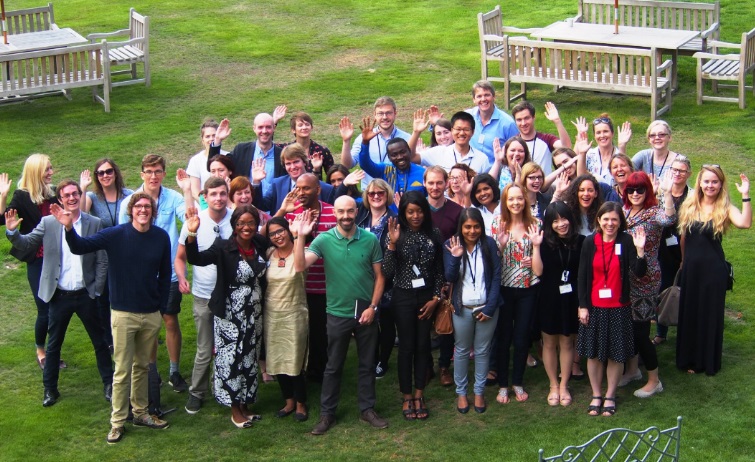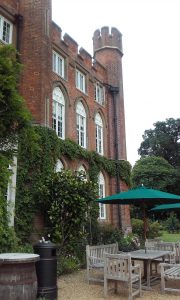
October 24, 2017, by Tara de Cozar
Life Beyond the Phd: Current student Liz gives an account of the Cumberland Lodge conference
From Tuesday 29 August-Friday 1 September 2017, Cumberland Lodge — an educational charity with the vision of more peaceful, tolerant and inclusive societies — held the tenth edition of its annual ‘Life beyond the PhD’ conference.
The conference strives to break down boundaries and encourage cross disciplinary discussions, and aims to tackle social divisions by promoting creative thinking and inclusive dialogue. It supports early career researchers and students of all ages and backgrounds through mentorship and a range of activities led by the education team.
Liz Charalambous, a registered nurse who is currently studying for a PhD at The University of Nottingham, recently attended the conference. Here’s her account of the event:
Day one
On arrival we were given a guided tour where we learnt about the history of the Lodge.
The Lodge was made available by King George Vl in 1947 as part of an attempt to break down academic barriers, encourage interdisciplinary collaboration and understanding the root causes of social division. Today, under the Patronage of Her Majesty the Queen, Cumberland Lodge continues to recognise the need for cross boundary discussions, to share concerns, and to celebrate the value of doctoral research.
Following our arrival and registration, and a guided tour from Dr Rachel Smillie, Education Officer of Cumberland Lodge, the day kicked off with presentations from Dr. Florence Hazrat, Post-Doctoral Research Assistant, University of Geneva and former Cumberland Lodge Scholar; Dr Shane Strachan, Author and Creative Practitioner; and Dr Matt Mower, Senior Research Officer, Department for Education. They discussed practical, personal, intellectual and geographical factors which can feed into navigating post-doctoral world.
The evening speaker was Dr Morgan White, author of ‘Towards a Political Theory of the University: Public reason, democracy and higher education’, who discussed market forces and the political role of higher education prompting us to think further about the role and purpose of higher education.
Day two
The second day of the conference featured expert and practical advice from Independent Careers Advisors Dr Steve Joy and Katie Hewitt on successful applications, covering CVs, interviews, cover letters, and workshops on presentations and the art of being heard. Dr Steve Cross, Public Engagement Fellow at the Wellcome Trust, guided attendees through the intricacies of public engagement.
The day concluded with an inspirational talk by Dr. Aref Kyyaly, Visiting Fellow, University of Southampton and CARA (the Council for At-Risk Academics) scholar. He spoke about the personal and professional challenges of pursuing scientific research in a war torn country and how CARA helped him to access support to continue vital research activities.
Day three
The day dawned with the opportunity to present our own research in smaller groups and receive valuable feedback in a constructive and supportive way, to practice what we had learnt, and to hear about the research of other students from a variety of disciplines.
The afternoon was particularly meaningful for me. Professor Debra Humphries — Vice Chancellor, University of Brighton and a fellow nurse — invited us to think about how theory underpins and shapes our work, and to embrace the opportunity to look at things through other disciplinary lenses. We concluded the day with an opportunity to work together to develop a collaborative research proposal based on our skills, talents and research expertise, and present to a research sponsor.
Day four
This final day concluded with useful tips for the viva from Dr Neil Sadler Lecturer in Translation and Interpreting, University of Belfast and former Cumberland Lodge scholar; Dr Sam Fowles, Barrister and former Cumberland Lodge scholar; and Dr Sophie Park, GP and Associate Professor in Primary Care, UCL Medical School. This was followed by a discussion on ‘why is PhD worth it?’ from Dr Tom Cutterham, Lecturer in United States History, University of Birmingham.
Conference Reflections
Entering into the magnificent portals of Cumberland Lodge widened my horizons and helped to blow away the cobwebs of imposter syndrome (for now). It served to remind me that my research is of value and that the age-old PhD mantra ‘keep going’ will help me to reach my destination, while opening my eyes to the range and plethora of diverse post-doctoral career options available.
Cumberland Lodge provided an opportunity for me to enter into discussions with, and discover the views of, others from a variety of diverse backgrounds. The opportunity to participate in discussions and to explore common concerns with others has allowed me to reflect on my research and see it from a different perspective which I hope will enrich the project. I arrived at Cumberland Lodge tired and stressed with worries, concerns, and questions. I left with a renewed sense of self confidence, increased self-awareness, a deeper love of my research area, new friendships and the promise of collaborating on an interdisciplinary paper with fellow PhD students whom I would never have met had I not attended the conference. Not least, being two years into a PhD, finding myself in a hospitable, calm environment with like-minded people going through a similar experience gave me a much needed boost.
The conference captured my imagination as it aspires to help students to reflect on how their academic studies could contribute the betterment of society. Having worked as a registered nurse for many years, this is the very reason why I came into research in the first place. I see research as essential to improving healthcare services and the quality of care our patients receive — particularly when it comes to the care of older people with dementia.
Cumberland Lodge is a special place. It is not only the sunshine glinting though the drapery of wisteria around the magnificent gothic windows that makes it so special, but in a changing world the underpinning philosophy of inclusion, collaboration, and striving for a better society will stay with me for a long time to come.
I would like to sincerely thank the Graduate School at the University of Nottingham for awarding me the scholarship to attend the ‘life beyond the PhD’ conference.
Liz Charalambous is a Registered Nurse and is currently studying for a PhD at The University of Nottingham. Her project is entitled ‘An Exploration of The Role of Volunteers in Supporting Patients with Dementia on Acute Hospital Wards: A Qualitative Study’.
She tweets as @lizcharalambou
Follow the conference hashtag on twitter #CLPhD
No comments yet, fill out a comment to be the first


Leave a Reply